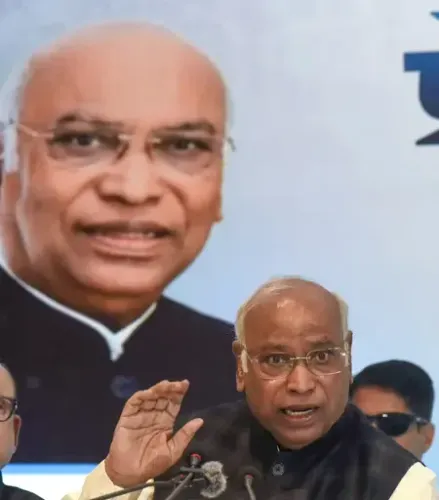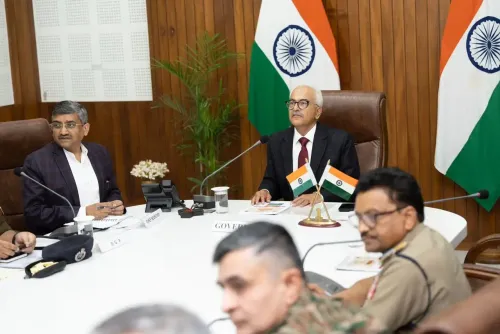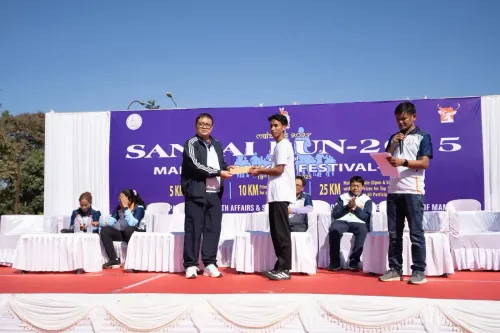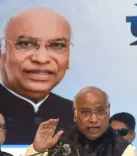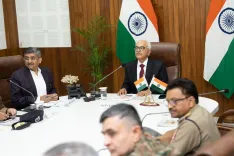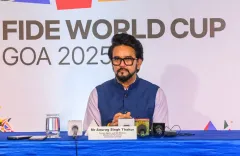'Chasing Controversy': A Deep Dive into the Bofors Scandal and Its Ramifications - A Review
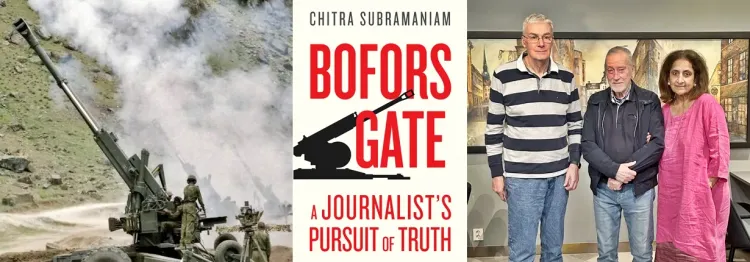
Synopsis
Key Takeaways
- Impact on Indian Politics: The scandal significantly damaged the credibility of two Prime Ministers.
- Arms Trade Exposed: It revealed the dark nexus between arms manufacturers and political entities.
- Judicial and Legal Reforms: The incident prompted Switzerland to amend its banking laws.
- Personal Struggles: Subramaniam faced numerous challenges while investigating the scandal.
- Revelation of Whistleblowers: Key figures emerged to help unveil the truth behind the corruption.
New Delhi, March 10 (NationPress) The scandal damaged the reputations of two well-known Prime Ministers (one posthumously), revealing the corrupt nature of the international arms industry and its connections with politics, and compelled Switzerland, a renowned banking haven, to reform its unapproachable laws to assist foreign nations in uncovering extensive corruption.
And all for a weapon system that had a reasonable chance of succeeding on its own, as we discover, and indeed went on to prove its value soon after.
The Bofors artillery gun scandal, involving politicians from various backgrounds, eager arms manufacturers, obscure yet powerful arms dealers, stubborn bureaucrats, diligent prosecutors, committed media personnel, a Bollywood superstar, among others - could easily have been crafted by the likes of Fredrick Forsyth, David Baldacci, or John Le Carre in one of their gripping narratives.
Yet, it is journalist Chitra Subramaniam, recognized for her extensive coverage from Switzerland over a decade regarding the scandal's developments, who undertakes this task.
In "Boforsgate: A Journalist's Pursuit of Truth" (Juggernaut, 328 pp, Rs 899), she provides a comprehensive account of the incident that led to the downfall of the Rajiv Gandhi government, tarnished the careers of numerous politicians in subsequent administrations, and exposed the hypocrisy of Swedish global peacemaker Olof Palme and his country, primarily through her own reporting and experiences.
This was despite her admitting to needing to understand "What on earth was a howitzer" and having to consult the UN Library - back in those days before the internet - to find out!
Detailing her life and career to explain how she ended up in Switzerland when the scandal erupted in April 1987, Subramaniam narrates how the entire disgraceful incident was uncovered in a rather ludicrous fashion. A Swedish bank sought clarification from a senior Bofors executive regarding some covert large payments made by the company into Swiss bank accounts. The Swedish banker had no issue with the transfers but questioned their classification - and the secrecy surrounding them, prompting the executive to present a copy of the contract, spelling out its provisions, to substantiate his claim.
This inquiry likely inspired the Swedish Radio report in April 1987 that alleged bribery in the Bofors arms deal with India, igniting a frenzy in New Delhi, and leading to requests for updates from Subramaniam - who was then a correspondent for the Hindu.
Despite being relatively new to the profession, married for just four years, and expecting her first child in a few months, Subramaniam meticulously built a network of informants spanning from Switzerland to Sweden, secured classified documents, and while heavily pregnant, spent hours in government offices in Geneva poring over extensive registries to track down the firms related to the financial trail.
Her impending baby's crib became a storage spot for the papers and documents she collected, and she spread them out on the floor as she attempted to trace the money trail.
However, as she illustrates, it was not an easy journey for her - facing her family's anger over her commitment to the story despite having a newborn, moments of conflict and silent tension with her husband, and a supervisor who appeared to have his own agenda and showed no regard for her trust and promises to her sources.
Additionally, there was external pressure - bribes, including at least one suitcase dropped on her desk or offers of a more lucrative job, incrimination, with her bank account hacked and money placed into it, escalating to threats - such as harm to her son, vandalism, and attempts to sabotage her efforts, culminating in character assassination.
Yet, amidst all these threats, she identifies "Tom and Jerry" and "Uriah Heep" (after a rather unpleasant character from Charles Dickens), with the latter described as the most vicious. However, there were also benefactors. Like "Snowdrop" in Switzerland - who even promised her protection, and her version of "Deep Throat" in Sweden, known as "Sting", generous in supplying documents - albeit at his own pace.
Among other enigmatic figures was a suave Swedish arms dealer in Geneva, whom she referred to as "Kaa" from Rudyard Kipling's Jungle Book, who offered a candid and no-holds-barred perspective on the arms trade and served as a sounding board for some of her findings - including the probable size of the bribe.
While most of these characters remain anonymous, "Sting" revealed his identity 25 years later as Sten Lindstrom, a former chief of the Swedish police, in a comprehensive interview - featured in the book - where he shares his insights on the case - and its investigation, particularly by India, his motivation for becoming a whistleblower, and the role of Rajiv Gandhi.
Moreover, enhancing the book's value are her interactions with one of the Hinduja brothers, Arun Nehru, V.P. Singh, bureaucrat Bhure Lal, Atal Bihari Vajpayee, a young Arun Jaitley, etc., who were briefly part of the Indian investigation, along with a revealing interview with flamboyant former Army chief Gen K. Sundarji, who held his position during the scandal.
A few minor shortcomings include the list of dramatis personae at the beginning lacking identification, and some inaccuracies such as misnaming the legendary long-time Saudi Oil Minister Sheikh Yamani as Egyptian, and an Indian Prime Minister as S. Chandrashekhar instead of Chandra Shekhar.
Overall, Subramaniam's book does not seek to pass judgment on the roles of Rajiv Gandhi, and the two Aruns - Arun Nehru and Arun Singh, among other questions, but presents her account of what she discovered - and the eventual result.
The truth was contained in the evidence submitted to India by Swiss officials in 1997 - yet remains undisclosed.
(Vikas Datta can be reached at vikas.d@ians.in)

